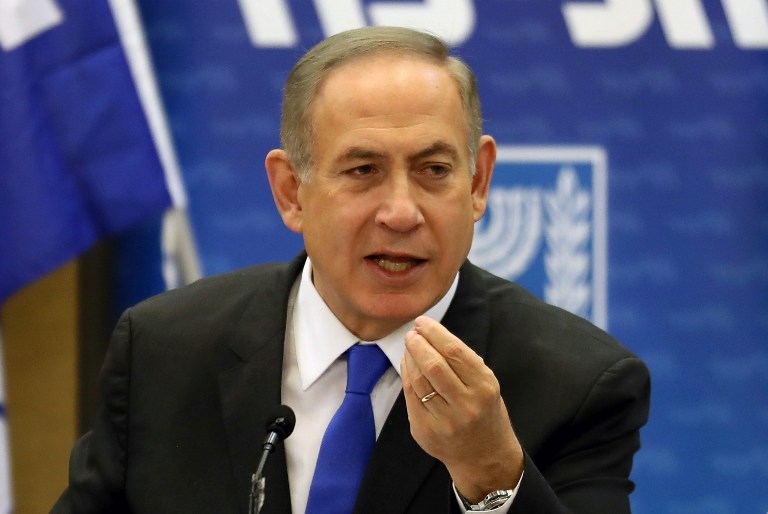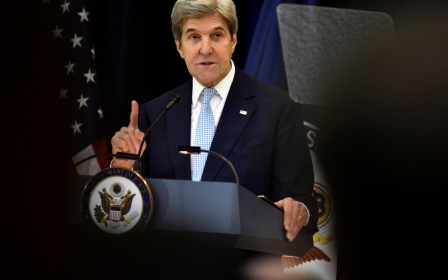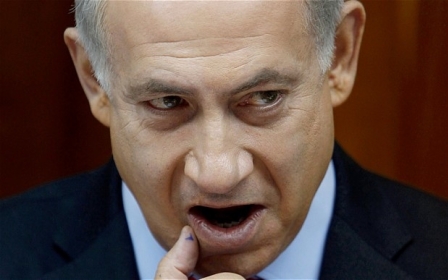Police question Netanyahu in corruption probe

Police questioned Prime Minister Benjamin Netanyahu for three hours on Monday evening as part of a corruption probe that has shaken Israeli politics, media reports said.
Three investigators arrived at the residence in central Jerusalem at around 6:30pm local time, according to public radio and other reports.
They were expected to question the prime minister over whether he illegally accepted gifts from wealthy supporters.
"At this stage there (are) no further details to be given," a police spokesman said.
On Monday, Netanyahu denied any wrongdoing, telling his political opponents to put any "celebrations" on hold.
The long-running inquiry has looked into whether Israeli and foreign businessmen have offered gifts worth tens of thousands of dollars, as well as another unspecified issue, according to the reports.
Attorney General Avichai Mandelblit has reportedly decided to upgrade the inquiry to a criminal probe, although he has yet to confirm this.
Screens were mounted at the entrance to the compound in central Jerusalem, in an apparent bid to shield the investigators' arrival.
"We hear all the media reports. We see and hear the festive spirit and atmosphere in television studios and in the corridors of the opposition," Netanyahu told lawmakers from his Likud party on Monday, according to a video posted to his Facebook page.
"I want to tell them to wait for the celebrations. Do not rush. I told you and I repeat: There will be nothing because there is nothing. You will continue to inflate hot air balloons and we will continue to lead the state of Israel."
Months-long inquiry
Police have carried out the inquiry in secret over the course of some eight months and recently arrived at an important breakthrough, reports said. Some 50 witnesses are said to have been questioned.
In July, Mandelblit said he had ordered a preliminary examination into an unspecified affair involving Netanyahu, with no details given.
US billionaire and World Jewish Congress president Ronald Lauder has been among those questioned in the probe over gifts he allegedly gave Netanyahu and alleged spending on trips for him, Israeli media reported.
Lauder, whose family founded the Estee Lauder cosmetics giant, has long been seen as an ally of Netanyahu, who in the late 1990s put him in charge of negotiating with then Syrian president Hafez al-Assad.
Netanyahu has acknowledged receiving money from French tycoon Arnaud Mimran, who was sentenced to eight years in prison over a scam amounting to 283m euros ($298m) involving the trade of carbon emissions permits and the taxes on them.
Netanyahu's office said he had received $40,000 in contributions from Mimran in 2001, when he was not in office, as part of a fund for public activities, including appearances abroad to promote Israel.
He has also come under scrutiny over an alleged conflict of interest in the purchase of submarines from a German firm.
Media reports have alleged a conflict of interest over the role played by the Netanyahu family lawyer, David Shimron, who also acts for the Israeli agent of Germany's ThyssenKrupp, which builds the Dolphin submarines.
Beyond those issues, Israel's state comptroller released a critical report in May about Netanyahu's foreign trips, some with his wife and children, between 2003 and 2005 when he was finance minister.
'Campaign of provocation'
Netanyahu, 67, is in his fourth term as prime minister and currently heads what is seen as the most right-wing government in Israeli history.
He has served as premier for a total of nearly 11 years, fast approaching founding father David Ben-Gurion's 13 years.
Polls have shown that if elections were held now, his Likud party would finish behind the centrist Yesh Atid, but that voters still prefer Netanyahu as prime minister.
The inquiry has led to fierce debate in Israeli politics, with Netanyahu's allies accusing opposition politicians and some in the news media of unfairly pressuring the attorney general.
Regional Cooperation Minister Tzachi Hanegbi, in comments on army radio on Monday, denounced what he called a "campaign of provocation and incitement" against Mandelblit.
However, others have accused Mandelblit of moving too slowly in the highly charged case.
Netanyahu's predecessor as prime minister, Ehud Olmert, was forced to resign while dogged by corruption allegations.
Olmert entered prison in February and is serving 27 months for corruption, making him Israel's first former premier to serve jail time.
New MEE newsletter: Jerusalem Dispatch
Sign up to get the latest insights and analysis on Israel-Palestine, alongside Turkey Unpacked and other MEE newsletters
Middle East Eye delivers independent and unrivalled coverage and analysis of the Middle East, North Africa and beyond. To learn more about republishing this content and the associated fees, please fill out this form. More about MEE can be found here.




